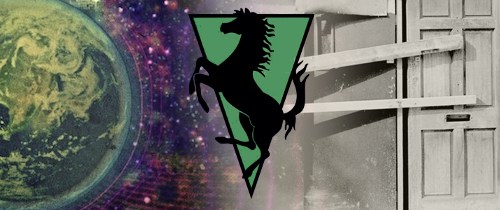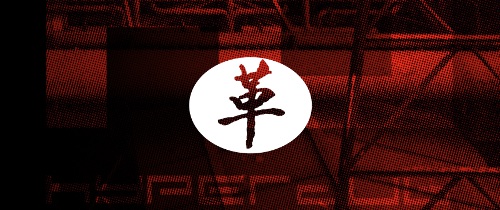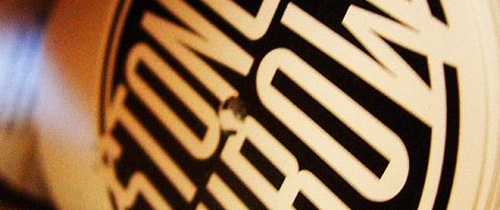10: R&S
2010 was the year that Belgium’s R&S Records – once home of Aphex Twin and more – decided that they wanted to become relevant again, assembling a troupe of young British producers in Pariah, Space Dimension Controller and James Blake, while also making room for old(er) hands, enlisting Model 500 for a comeback single and Untold for a diversion into heavyweight electro.
Key releases:
Untold: ‘Stereo Freeze’
James Blake: CMYK EP
Pariah: Safehouses EP
Space Dimension Controller: Temporary Thrillz EP
09: HYPERDUB
Many had Hyperdub down as 2009’s label of the year, and 2010 saw Kode9’s imprint mature further. Three of its key acts in Darkstar, Ikonika and Terror Danjah produced worthy full-lengths, while albums weren’t the only focus; new singles from Cooly G, Scratcha DVA and LV were among their best to date.
Key releases:
Ikonika: Contact, Love, Want, Have
LV: ‘Boomslang’ / ‘Zharp’
Darkstar: North
Terror Danjah: Undeniable
Scratcha DVA feat. Fatima: ‘Just Vybe’
08: RUSH HOUR
Somewhere, at some point, the boys at Rush Hour appointed themselves guardians of all that is true and good in house music, and it’s a role they’ve taken to with real flair.
Though its output of new material has been excellent (12″s by Hunee, FaltyDL and Cosmin TRG all impressed), the Amsterdam-based imprint’s inclusion here is based largely on its run of extraordinary reissues and archive finds: chief among them being Virgo’s self-titled album, which has long been revered as the greatest house album of all time, but until Rush Hour stepped in was impossible to find on vinyl for anything approaching an affordable price. Rush Hour also helped Virgo mount their first ever live tour of Europe and pressed up a 12″ of never-before-released vintage tracks by the Chicago producers for a 12″ to be sold only tour and over the counter at record stores (i.e. not online). These guys, it seems, are now guardians of more than just house music.
It didn’t stop there. Following their 2009 Anthony ‘Shake’ Shakir anthology, which in one fell swoop granted the hitherto unsung hero of Detroit techno a new lease of life and an assured place in history, Rush Hour continued to make his classic productions available on wallet-friendly individual 12″s and also commissioned new remixes from Space Dimension Controller and FaltyDL. They inaugurated a new imprint, House Of Trax, dedicated to repressing sure-shots from the iconic Chicago label (a particularly welcome move, as most original Trax 12″s are notorious for their dreadful sound quality). Further reissues of keeningly romantic techno by Mayday (Derrick May), unclassifiable 313 dance brilliance from Recloose, dope deep house from Rick Wilhite and the holy grail of rare 80s funk/fusion from Mandre (Mandre 4) capped a 2010 that the tireless Dutchmen responsible ought to be very proud of indeed.
Key releases:
Virgo: Virgo
Recloose: The Early Works
Mandre: Mandre 4
07: NOT NOT FUN
Not Not Fun has always been a fertile source of groggy US psychedelia, but 2010 saw it deliver its richest yield to date. Co-founder Amanda ‘LA Vampires’ Brown has had a hand in its two strongest releases of the past 12 months: a split 12″ with Psychic Reality and the utterly captivating Zola Jesus collaboration LA Vampires Meets Zola Jesus. Both these records exemplify Brown’s canny, inspired application of dub techniques and atmospherics to a very Californian brand of lo-fi.
Dub was also at the heart of Ensemble Economique’s recent Psychical, an otherworldly mingling of languorous drones, Shackleton-esque rhythm and sampled patois. Dylan Ettinger’s cult cassette New Age Outlaws was reissued in ‘Director’s Cut’ form on vinyl, sounding more than ever like the soundtrack for the futuristic cop movie that William Friedkin should have made, while Umberto presented an accomplished if not exactly revelatory take on the John Carpenter and Goblin school of of horror-flick synth music in Propechy Of The Black Widow. Elsewhere we we were treated to the swansong single from Pocahaunted, the marvellous On Patrol LP from hypnagogic poster-boy Sun Araw, and the beautifully designed Bored Fortress 7″ series that took in tracks from Ducktails, Rangers, No Age and Sex Worker. The records on Not Not Fun in 2010 weren’t just records, they were self-contained worlds, true works of sonic fiction demanding – and deserving – absolute immersion and engagement.
Key releases:
LA Vampires Meets Zola Jesus: S/T
Ensemble Economique: Psychical
Dylan Ettinger: New Age Outlaws – The Director’s Cut
06: STONES THROW
This was the year that Stones Throw shed its backpacker hip-hop stigma once and for all. Indeed, looking at the label’s 2010 catalogue once might go as far as to say that Stones Throw’s is barely a hip-hop label at all anymore.
An apparent withdrawal from the frontline of underground rap has allowed label boss Peanut Butter Wolf to explore uncharted terrain, his digger impulse coming to the fore in the shape of various idiosyncratic reissues and archive finds. The Minimal Wave Tapes, essentially a showcase for the good work of Veronica Vasicka and her Minimal Wave imprint, set the tone, all torrid DIY synth-pop and new wave – about as far removed from the received image of Stones Throw as it’s possible to get. Then there was the Complete Works of cult singer/songwriter Mathew Larkin Cassell, African psyche-blues from Rikki Ililonga & Musi-O-Tunya, exquisite jazz minimalism from P.E. Hewitt’s ensemble and an invaluable selection of vocoder-based recordings by electronic music pioneer Bruce Haack.
Dam-Funk’s 2009 album Toeachizown was finally issued as a deluxe vinyl box set this year, and we were given a fantastic insight into his electro-soul origins on the Adolescent Funk compilation; James Pants’ Seven Seals LP was technically released last year, coming out in the no man’s land that was December 2009, but has given us an enormous amount of listening pleasure throughout 2010. Oh, and lest we forget, there was some decent hip-hop too – from Aloe Blacc, Guilty Simpson and J Rocc, not to mention too many Madlib-related offerings to keep count of.
Key releases:
Various Artists: The Minimal Wave Tapes
James Pants: Seven Seals
Bruce Haack: The Electric Voice
Dam-Funk: Toeachizown box-set
05: PLANET MU
In a year of established labels shape-shifting, a revitalised Planet Mu was one of the most rewarding. Mu has always put out good records, but in 2010 it switched focus from its old guard to its new, releasing a new Starkey album and stellar EPs by Ikonika and FaltyDL, as well as handing label debuts to Optimum, Rudi Zygadlo, Slugabed, Numan, Tropics and Swindle.
Most crucially though, it took a big chance on Chicago’s juke scene, releasing records by scene staples DJ Rashad and DJ Roc as well as two footwork compilations, one focused on the maverick lo-fi of DJ Nate. Throw in hazy pop full-lengths from Solar Bears, Oriol and Internal Tulips and Terror Danjah’s Power Grid EP, and you have a label that refused to stop giving this year.
Key releases:
DJ Roc: The Crack Capone
DJ Nate: Da Trak Genious
Ikonika: ‘Dckhdbtch’
Solar Bears: She Was Coloured In
04: HONEST JON’S
2010 was a remarkable year for Honest Jon’s. In terms of new material, Splazsh, the paranoid yet playful sophomore LP by Acress was a particular highlight, and the Moritz Von Oswald Trio Live in New York set arguably outdid their Vertical Ascent album of 2009. But it was probably the Wireless EP by T++ that best embodied what makes Honest Jon’s great, namely an artful mingling of past and present: for this, his final work under the T++ name, Torsten Profrock, took rhythmic inspiration from London garage, dubstep and jungle but derived its queasy instrumental textures from 1930s East African recordings liberated from EMI’s vast archive by HJ’s for an upcoming compilation on the label.
Speaking of compilations, Honest Jon’s put together some sublime sets this year, notably Shangaan Electro, a mind-melting survey of contemporary electronic dance-pop from Nozinja’s Music Productions in South Africa, and To Scratch Your Heart, a haunting collection of Turkish music recorded in the early part of the 20th century.
Last but not least, 2010 saw the launch of Dug Out, a new imprint curated by HJ’s manager and Mark Ernestus (Rhythm & Sound), which like their previous Basic Replay imprint is focussed on reissues of obscure reggae and dancehall bombs. This year’s generous haul included digi killers from King Kong and Anthony ‘Red’ Rose through to a lavish LP repress of Peace & Love, a trippy, spiritual reggae masterpiece by Dadawah. Final praise should go to the label’s in-house designer Will Bankhead, whose penchant for bold colours and characterful minimalism resulted in some of the most strikingly beautiful sleeves of 2010.
Key releases:
Various Artists: Shangaan Electro
T++: Wireless EP
Actress: Splazsh
03: EDITIONS MEGO
Ask any music nerd one year ago what they thought of when they heard the words ‘Editions Mego’ and they’d answer, without missing a beat: digital noise. They’d think of Pita (AKA label boss Peter Rehberg), Russell Haswell and Florian Hecker. They’d think: good stuff, but a bit… heavy-going. Ask them now and you’d likely get a very different reaction.
Don’t get us wrong: Mego has always been catholic in its output, and indeed its almost punkish irreverance is what elevated it above its more po-faced and academic peers from the off. But 2010 really saw the label spread its wings, the signal departure being its signing and releasing of breakthrough albums from Oneohtrix Point Never and Emeralds. Artists on Mego using synthesizers in the service of prettiness rather than ugliness; artists who favour soaring melody and pillowy textures over hard lines and ear-wrenching distortion? Surely not! Oh yes. Hell, even Antony Hegarty found his way onto the label, singing lead vocal on a 7″ version of Oneohtrix’s ‘Returnal’. No one saw that coming.
But if Mego had abandoned its roots, then we wouldn’t be praising it for its ranginess. 2010 brought us a new album of brainbox minimalism from Mark Fell, a gnarly cassette from Sunn O))’s Stephen O’Malley, an album of distressed computer music from post-punk survivor Cindytalk and reissues of what are probably the two most iconic records in the Mego catalogue: Kevin Drumm’s Sheer Hellish Miasma and Fennesz’s Endless Summer. Oh, and the label has recently announced that it will kick off 2011 with a CD edition of Bill Orcutt’s 2009 private press album of tear-out acoustic blues, New Ways To Pay Old Debts. To Peter Rehberg: the avant-garde’s finest A&R man.
Key releases:
Oneohtrix Point Never feat. Antony Hegarty: ‘Returnal’
Emeralds: Does It Look Like I’m Here?
Cindytalk: The Poetry of Decay

02: NIGHT SLUGS
Bok Bok and L-Vis 1990’s Night Slugs label, an evolution of the club night they made their name with, is a shining example for both quality and quantity. Already this year there’s eight 12″s in the main Night Slugs series with two more due, four in the white label sub-series, and a CD compilation announced for later in the year. Has the quality control dipped once? Not particularly.
You can talk all day about Night Slugs’ position at the vanguard of a new school of underground club music producers, free from formula and geographical boundaries while staying true to the UK soundsystem culture (in particular, grime) that birthed the label. But at the end of the day, what they’ll be remembered for in 2010 is simply putting out more quality dance singles than anyone else, UK or otherwise, and doing it organically; releasing music almost solely from friends that they’ve made doing the Night Slugs club night. Undeniable anthems by Mosca, Girl Unit and Jam City are just the tip of the iceberg.
Key releases:
Mosca: ‘Square One’
Girl Unit: ‘I.R.L.’
Jam City: Refixes EP
Kingdom: That Mystic EP

01: OLDE ENGLISH SPELLING BEE
It might be overstating the case to say that Olde English Spelling Bee has defined 2010, but the truth isn’t far off. Certainly one of the most compelling narratives in the music of recent times has been the birth and growth of a new, rudely healthy and maddeningly diverse psychedelic underground in the US, and, unconsciously or otherwise, OESB has become synonymous with it.
Todd L, the New York-based label’s boss, is understandably weary of his baby being pigeonholed. There are many who would like to treat OESB as ground zero for “hynagogic pop” – a genre identified, and term coined, by The Wire‘s David Keenan to describe a new wave of artists, led by OESB regular James Ferraro, making music influenced by heavily refracted memories of trashy ’80s and early ’90s pop culture. Certainly a great deal of OESB’s output, and Ferraro’s in particular, fits the tag – Todd is the first to admit this – but there’s also a great deal that stands apart.
Indeed, what’s so laudable about Olde English Spelling Bee is its unwillingness to adhere to any aesthetic or logic other than its own. Its finest release this year came via The Wirral of all places, in the shape of Forest Swords’ Dagger Paths – an unclassifiable, melancholic miasma of Morricone-esque guitar, grounded dub bass, neo-tribal rhythm and languorous drones. Not far behind was the long-awaited vinyl issue of James Ferraro’s TV-mediated, Valium-spiked masterpiece Last American Hero, previously only available on cassette, and a more conventional – but no less compelling – set from singer/songwriter Julian Lynch, Mare. Following a triptych of withering indie-pop LPs from Pigeons, Rangers and Big Troubles, and diverting singles from Ducktails and Greatest Hits, we were treated to a suite of vertiginous synthesizer music from Stellar OM Source and, in Autre Ne Veut’s self-titled debut, one of the most bizarre, brazen and gloriously stomach-turning pop albums of the 21st century so far.
All this has been complemented and heightened by the label’s dazzling, idiosyncratic visual identity. It’s not just about the cover art (which is, naturally, top-notch); OESB has also all but reinvented the music video for our times, with the help of artists and filmmakers like Alice Cohen as well as fans (whose own efforts are frequently posted on the OESB blog). Like the music, these largely collagistic videos make a virtue of the grainy and degraded, of jumbling signs and signifiers from a forgotten mainstream.
Olde English Spelling Bee is a label that desires to be like nothing that has come before and nothing that will come later; in short, a label that wants to be nothing other than its own mad self. There’s a sly humour at work in all its offerings, but it’s tempered by an absolute, exacting seriousness when it comes to the important stuff. We spoke briefly to mainman Todd L. over e-mail recently; he apologized in advance for seeming aloof in his answers. “I can’t play the game as others do,” he said. We wouldn’t want it any other way.
Key releases:
James Ferraro: Last American Hero
Forest Swords: Dagger Paths
Julian Lynch: Mare
Autre Ne Veut: Autre Ne Veut
Tell us about your life prior to the founding of Olde English Spelling Bee.
“I grew up listening to lots of radio and obsessively making mix cassettes. At age 15 I ran away from home.”
How did the label come into being?
“I don’t drink often but alcohol was involved in the formation. I mostly avoid alcohol now.”
Are there any particular labels, old or contemporary, that helped inspired Olde English Spelling Bee?
“ESP-Disk, BYG/Actuel, INA-GRM, Takoma, Siltbreeze (90s version), Majora, Bananafish magazine, Forced Exposure magazine, Shrimper, Bobby J, Drag City.”
How would you describe the current state of the US underground and OESB’s role within it?
“I think the internet is a dragon.”
What’s your personal relationship to vinyl?
“It weighs down my life…I prefer the vinyl format. Some music seems to deserve a life on vinyl. All of the OESB releases have been on vinyl.”
What’s your attitude to demos?
“There’s a huge box of unlistened-to demos. But I’ve been sent some good ones for sure.”
Ducktails has undoubtedly been a prominent figure in the OESB story of late. How did you meet Matt Mondanile and come to work with him?
“I met him at a concert. He is interested in meeting ladies and I am interested in putting out records. We have helped each other in these respects.”
A lot of the artists and records you’ve provided a platform for have become associated with David Keenan’s formulation, “hypnagogic pop”. What are your feelings about this tag? Is it all helpful in describing or understanding OESB’s output?
“Despite some glaring omissions and questionable inclusions he was completely onto something in that article. Some of OESB’s output fits into that scheme and are possibly some of the best illustrations of H.P. – but only some of OESB’s output fits. I’m not a hypnagogic pop label…I’ve put out just as many improv or noise or damaged psych records as H.P. albums…”
To what extent would you say OESB is a product of New York? Do you think of it as a New York label?
“The idea was hatched in Portland, Oregon but all releases have materialized in New York. So by definition I guess it is. In practice I’m not so sure as I do not actively interact with the New York music scene and there’s a lot of non-New York artists being represented.”
Do you use the same artist for all OESB cover art? Do you have any particularly favourite OESB sleeves?
“Many different artists. Lots of nice sleeves. I don’t like to play favourites but most people love the Susan Alcorn gatefold – that one was done by Mary O’ Malley.”
What golden nugget of advice would you offer to someone planning to start a record label today?
“If you try stealing any of my artists I’ll come after you full force. You will be paid a visit by my crew.”




































